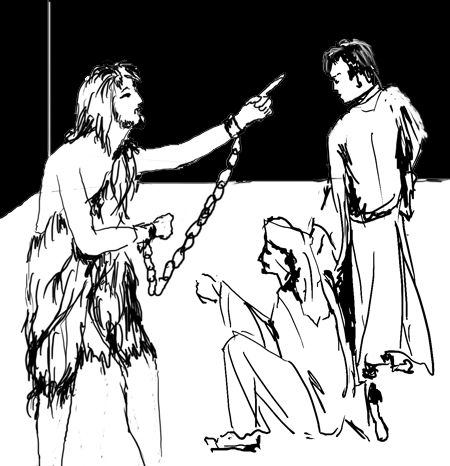 3 Sunday of Advent, Year A
3 Sunday of Advent, Year A
Is 35:1-6a, 10; Jas 5:7-10; Mt 11:2-11?
Introduction: This is a homily/Scripture reflection in a book, titled: ‘Every Week God Speaks We Respond’, Cycle A, intended to be published in the future by Reverend John Tran Binh Trong.
It was published in Vietnamese in the US 2008 and republished in Viet Nam 2011. To keep the author’s writing style, this homily has not been edited and may not be by a hired hand. However, if readers would like to point out mistake(s) in spelling and grammar and/or to suggest English phrases and expressions, it would be greatly appreciated by the author, whose English is not his mother tongue and who did not live in the US until his adulthood. Passive sentences are used intentionally in this context as to avoid using the first personal pronoun ‘I’ when applicable. That might be associated with any idea of egotism, in accord with the French saying, known as: ‘Le moi est haissable’ (The ego is detestable).
In a nation, which is filled with social and moral problems such as injustice, corruption, unemployment, shortage of food, high cost of living, and social unrest and so on, then people would lose faith in their government. The Hebrew nation at the time of Jesus was a nation filled with many social ills and problems. Their nation was occupied by the Romans, a foreign power. Internally there were divisions between political and religious factions. Their puppet King Herod led the immoral life by taking his brother's wife.
When John the Baptist spoke out against it, he was put in jail. Even though being relatives of Jesus, yet the family of John the Baptist lost contact with the Holy Family when Joseph and Mary took the child Jesus to Egypt. On their return, the Holy Family settled in Nazareth of Galilee while the family of John the Baptist were in Judea, about seven to eighty miles apart. At that time, the means of transportation was simple that Jesus and John the Baptist did not have a chance to meet. From his prison cell where he heard of Jesus' works, John sent a delegation to ask Jesus: Are you the one who is to come or should we look for another (Mt 11:3)?
John's question to Jesus means something like this: are you the one who is to come to eliminate social ills, injustice and evil in the society? It is strange that previously John had talked to his disciples about Jesus: I am not worthy to carry his sandals. He it is who will baptize you in the Holy Spirit and fire (Mt 3:11). When he saw Jesus, John the Baptist introduced Jesus to his disciples: There is the Lamb of God, who takes away the sin of the world (Jn 1:29). Yet today John the Baptist sent his disciples to ask Jesus whether he was the one who was to come. So did he pretend to ask? Did he doubt the divine mission of Jesus? Alternatively, was he too anxious, no longer patient enough to wait for the Messiah to come to punish those evil doers? If his hidden intention was so, then his question meant to urge Jesus to act. Jesus did not answer yes or no. He did not confirm or deny the title of Messiah. Here was Jesus' answer to John's question: Go back and report to John what you hear and see: the blind recover their sight, cripples walk, lepers are cured, the deaf hear, men are raised to life, and the poor have the good news preached to them (Mt 11:4-5). That was the good news of the messiah to come.
The reading from the Book of the prophet Isaiah was written at a time when life in Israel was miserable. Expelled from their own land, the Jewish people had no idea when and how to begin to rebuild their lives. Yet Isaiah's own experience of being close to God gives them hope. He shared that vision of hope with his contemporaries in writing. That is also the vision shared by Saint James in his epistle today. Saint James tells us: Make your hearts firm, because the coming of the Lord is at hand (Jas 5:8). So the prophet Isaiah and Saint James could see beyond the chaos to a bright and renewed future.
Looking into our own situations, we may wonder whether we face similar problems of life as the Hebrew people did at the time of Jesus. We all have problems in our lives: personal problems, health problems, marital problems, family problems, social problems, and church problems, job related problems and so on. It is so easy to be bogged down in the chaos and problems in our lives. In difficult and confusing times, we can raise questions similar to John’s questions. Is the Lord the one who can free us from sickness, disease and suffering? Is the Lord the one who has power to heal emotional wounds between husband and wife, parents, brothers and sisters and children?
Is the Lord the one who can help our children change their life style and amend their lives? Is the Lord who can liberate us from loneliness, anxiety, worry and fear or are we to look for something else such as astrology, good luck, and fortune telling? Is the Lord the one who can give meaning and purpose to our lives, or are we waiting for somebody else? Is the Lord who will come to save us as the prophet Isaiah has promised (Is 35:1-6).
Prayer for putting faith in the Savior about to be born:
Oh! Savior about to be born!
Impossible, I will not seek any other god.
But will put my faith and trust in you alone
Come. O come Emmanuel!
Come and free me and save me. Amen.
John Tran Binh Trong